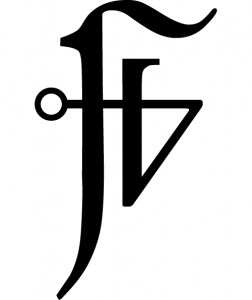ON THE LITERARY DETERRITORIALIZATION OF THE OCCULT
MAGICK IS SUCH my jam it’s the best. To intervene, to sculpt the forces in motion that lie ever behind all phenomena – I really don’t know how to work any other way. Even tho I suck at math, I’m pretty boss at jimmying an algorithm, noticing how the hidden variables shift and float. Numbers are less important than access to archetypes, gods as guides dropping this or that for us to notice, signposts and gestures, fleeting affinities that when frozen stand as nexus-objects multi-dimensional we can intuit beyond boundary. With the Will, that’s us – burning variable altering environment by manipulating the living furniture in the hidden room behind.
 The letter word the sign is never not a sigil. Given, there are greater and lesser degrees of involvement. Sometimes the immobility of the intent is monolithic and plinth-like, entirely discernible, or else it’s more about the splitting/rejoining of a designated grammar, terms or characters as place-holders for the energies contained therein, their recombinant effect resulting in whatever transcendent endgame is necessary to render organs null and of a single glowing body.
The letter word the sign is never not a sigil. Given, there are greater and lesser degrees of involvement. Sometimes the immobility of the intent is monolithic and plinth-like, entirely discernible, or else it’s more about the splitting/rejoining of a designated grammar, terms or characters as place-holders for the energies contained therein, their recombinant effect resulting in whatever transcendent endgame is necessary to render organs null and of a single glowing body.
Expression bunches and twists the only fabric, tears through veils, the silence, so that we might recalibrate, effect a given change, order what we know as Chaos and the rest of it.
One thing I’ve noticed is that literary writing by self-identifying occultists is often quite bad, even as (or because) it demonstrates its principles. On the other hand, literary writers who’re interested in the dynamics of occult philosophy and practice have generally produced exciting work.
The best example, my go-to guy, is Henri Michaux. More adept at watching his own imagination than any other artist I can think of, he explored inner worlds, wrote exorcisms, and all the time revealed his process. The most memorable piece in this vein is a malediction called “I AM ROWING”: READ MORE >
